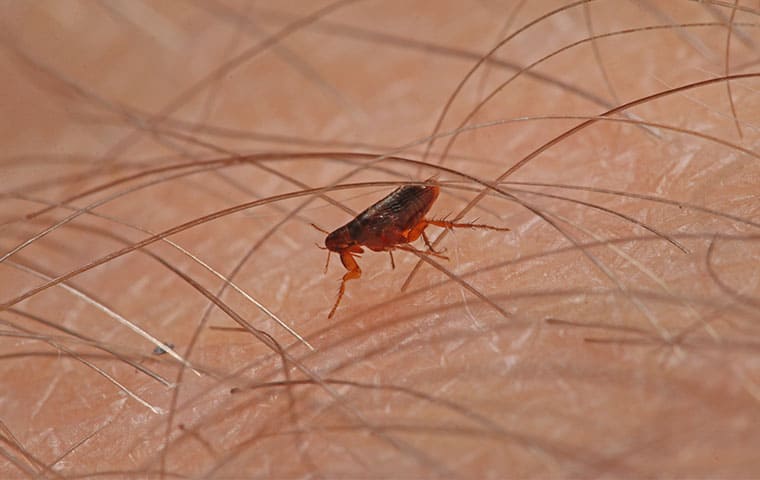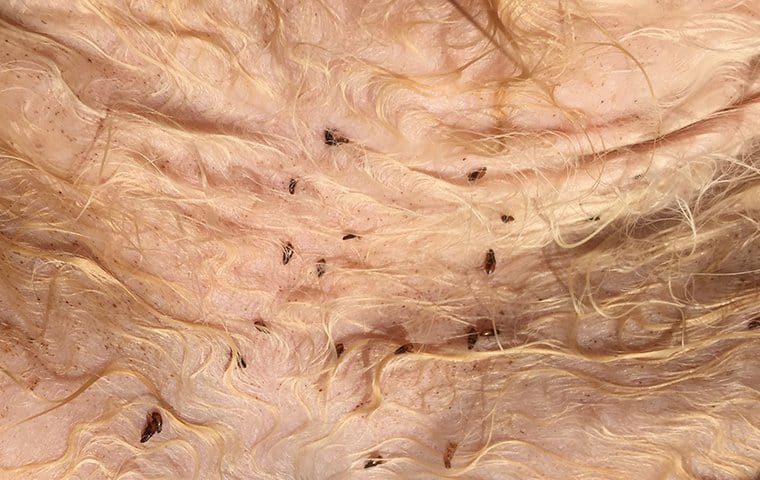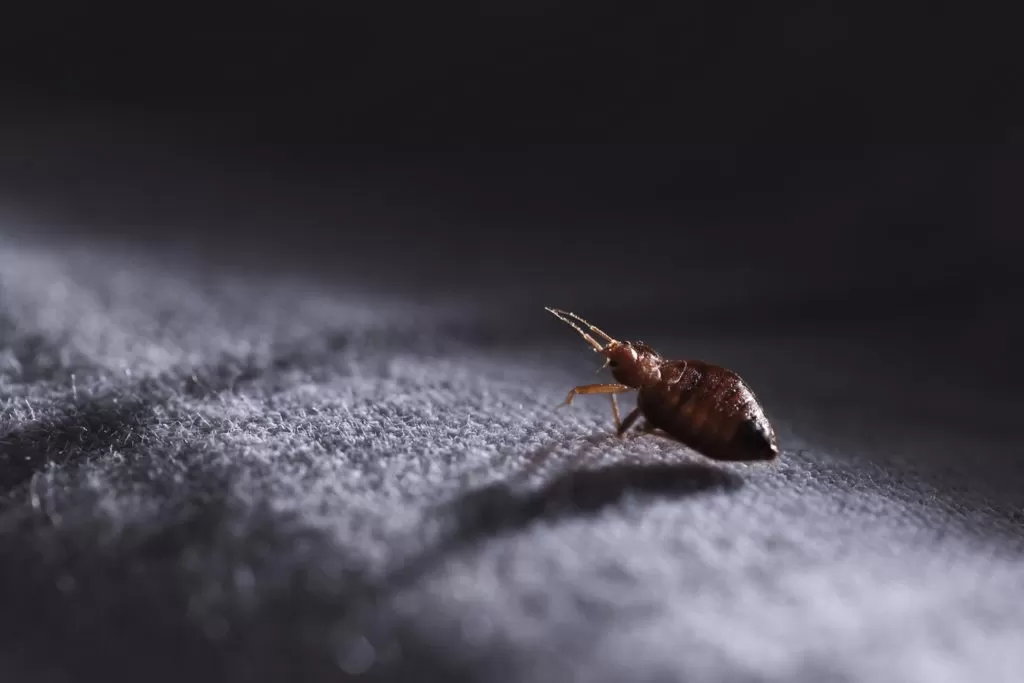It can be heartbreaking watching your pet struggling with fleas. They’ll scratch their itchy skin to the point that they injure it, and they might even shed fur. And if you don’t get them the care they need right away, more and more fleas may start to attack not just your dogs and cats, but your home too.
A flea infestation gets even worse when it starts to affect humans. You might see some on your clothes and shoes. Before you know it, you might be scratching your own skin because of the tiny bites they leave.
If you’re desperate to get rid of a flea infestation, you’re probably looking at different DIY repellents or cleaning products to help kill the fleas. You might have even thought of using repellents for other pests to deter fleas from attacking you, your pets, and your home.
But does insect repellent work on fleas, or are you just wasting your favorite anti-mosquito lotion and citronella oil? Let’s find out together.
Flea Infestations Affect Both Pets and Humans

Image Credit: Able Pest Management LLC
While fleas love infesting animals like cats and dogs, they can also bite humans. The fleas from your pets can transfer to your clothes, socks, shoes, bedding, and more. And then, it’s just a matter of time before you get your first bite.
These tiny, pesky fleas bite the skin of people and animals because they feed on blood. The breaking of the skin can lead to pain, itchiness, skin irritation, and in the worst-case scenario, skin infections.
Fleas don’t just leave physical pain and discomfort in their victims. They also leave a psychological effect. People might develop anxiety about their health and continuous itching. Meanwhile, dogs and cats won’t be as lively and happy.
If your pet has a flea infestation, it’s important not to sweep it under the rug on the pretense of it being “normal” for cats and dogs. You must stop the situation as soon as possible before these insect bites turn into skin diseases and affect your mental health.
Can an Insect Repellent’s Active Ingredients Repel Fleas?

Image Credit: Aruza Pest Control
There are plenty of treatments available for pets with fleas. However, it’s not as easy to find products that help get rid of fleas in clothes, furniture, and around the home.
But did you know that you can maximize the insect-repelling products you already have by using them to deter fleas from attacking you and your pets?
Technically, fleas are insects too. The active ingredients that harm mosquitoes and other small bugs can be just as effective on flies. Even if the instructions on your repellents say it deters or kills mosquitos and flies, chances are, it can also repel fleas.
So, what active ingredients in insect repellents are also effective on fleas? Here are just a few of them:
1. DEET (N,N-diethyl-m-toluamide)
Perhaps the most popular active ingredient in insect repellents is DEET, also known as picaridin or N,N-diethyl-meta-toluamide. A high concentration of DEET is infused in many leading aerosol bug sprays, lotions, sunscreen, and other popular forms of insect repellent.
DEET products work by disrupting the neurons that allow fleas to smell humans and animals. In short, the use of DEET keeps fleas from figuring out where you are so that they don’t bite you.
Even if you haven’t heard of this chemical before, you most likely have DEET repellents lying around at home. About one-third of the American population uses DEET products to protect themselves from insect bites and illnesses like the Zika virus, malaria, and Lyme disease.
Note, however, that DEET can damage certain types of fabrics, such as spandex, rayon, and leather.
2. Permethrin
Another active ingredient in insect repellents is permethrin. This powerful substance is an insecticide, which means it kills bugs and insects, including fleas. It’s usually found in pump sprays and aerosol sprays in high concentrations.
Repellents with permethrin are great for spraying in tents, homes, or on your clothes and furniture if you want to get rid of fleas. They’ll stay away from wherever you spray it as soon as they smell the substance. And if they dare to come close, it could end up killing them.
If you want to get rid of fleas by spraying some permethrin-infused products in the air, make sure to wear proper gear, like long pants.
3. Natural repellents like citronella and eucalyptus
Even natural insect repellents like essential oils can deter fleas. Similarly to DEET, citronella oil (along with eucalyptus and lemon oils) has a strong odor that can mask the smell of humans and animals. The fleas won’t be able to smell you, so they won’t hunt you down to feed on your blood.
Warning: Insect Repellents Can Harm Your Beloved Fur Babies

Image Credit: Perfect Carpet Cleaning
But just because insect repellent products are effective for getting rid of fleas, it doesn’t mean you should just use them mindlessly. The active ingredients we listed above aren’t just harmful to fleas—they can be toxic to your cats and dogs and cause adverse reactions.
Insecticides like permethrin can be poisonous to animals. Meanwhile, DEET-infused repellents can cause neurological problems in cats and dogs, resulting in seizures, difficulty in breathing, and even death.
Instead, try out these methods to control fleas in your pet:
1. Use topical treatments and shampoos
Ask your trusted veterinarian for their recommended topical treatments and medicated shampoos to use on your pets. These treatments will be formulated with chemicals like fipronil and imidacloprid.
Aside from using a flea shampoo, make sure that you regularly bathe your pet as a prevention measure so that the fleas don’t come back. Make sure to lather up the shampoo properly to ensure that every area of their fur is washed.
2. Get an oral prescription from a veterinarian
While you treat your pet with topical treatments, you may also want to ask your vet for oral medication. After your pet takes these meds, fleas that bite them and feed on their blood will die. These meds are available in chewables and tablets.
3. Give your pet a flea collar
You can also let your pet wear a flea collar. These collars are infused with insecticides that repel fleas and potentially kill them if they get too close. Some insecticides you’ll find in flea collars include Amitraz and Deltamethrin.
The insecticides in these collars evaporate or diffuse into the air surrounding your pets, keeping them safe from fleas. Unlike the active ingredients in insect repellents, these insecticides are safe for animals.
Want to learn more about flea collars? Watch this informative video on how they can help control fleas and ticks in dogs, as well as a detailed tutorial on how to put it on your pet:
Other Ways to Handle a Flea Infestation
If the fleas haven’t gone away even after you use insect repellents and do the treatments for your pet listed above, it’s time to take matters into your own hands. Here’s how to get rid of fleas from your home once and for all.
1. Clean your home thoroughly
The first thing you should do is clean your home thoroughly, giving special attention to carpets, upholstery, and bedding. It would be wise to use a steamer to clean your clothes as well, just in case some fleas have gotten to them.
Vacuum your entire home, including small cracks in the walls and crevices of each room. That way, you can dispose of fleas and their larvae hiding in these corners.
2. Eliminate humid places for fleas to converge
Fleas thrive in warm, humid places. So, it’s best to eliminate these areas in your home. Keep humidity levels low in your home by never overwatering your garden or leaving stagnant water out, especially after rainfall.
3. Call the professional pest control
If you think your flea infestation at home has gotten out of hand, you may need professional assistance. Call up your local professional pest control service so that they can assess the situation in your home and tailor a treatment plan to finally get rid of the fleas.
Insect repellents may be effective at deterring fleas from biting you, but it doesn’t necessarily kill them. Pest control professionals, on the other hand, have access to professional-grade insecticides that will disrupt the life cycle of these pesky fleas in every life stage.
Conclusion
Fleas might be common in pets, but it doesn’t mean you shouldn’t take care of the situation as soon as you can. One way to deter fleas from harming you, your home, and your pets is by using insect repellents.
Protect your skin with DEET-infused lotions, permethrin sprays, and essential oils with strong odors. They might not say “fleas” on their product label, but they’re excellent at deterring fleas from biting you and leaving you with itchy spots.
Just remember that they’re not good for your dogs and cats, so ensure they have no access to these insect repellents. Instead, help control the fleas on their fur with things like flea collars and topical treatments from your vet. In no time, they’ll be back to healthy skin and a flea-free life!
